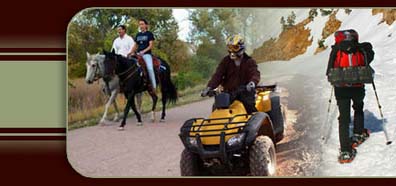Overview: Recreational Trails Program (RTP)
The premise of the RTP is to give States federal money in relation to fuel taxes generated within each State. This fuel tax money, when given to the States, is then used to fund trail programs.
Each State is responsible for administering the RTP within its state. Each state manages the program within the same general guidelines, but the details of when project applications are considered, and how projects are approved varies from state to state. The information in this overview is a general explanation to give you the tools you need to work within your state to implement a motorized trail project using RTP funds. When actually implementing your project you will find it very helpful to refer directly to the USDOT/FHWA RTP guidance.
RTP Background
A Federal assistance program for recreational trail construction, renovation and maintenance was created under the Intermodal Surface Transportation Efficiency Act of 1991 (ISTEA). Under the program, known initially as the National Recreational Trails Funding Program, funds were allocated to all States and the District of Columbia during only three of the legislation's initial six years (a total of $37.5 million) as well as during the transitional period of October 1997 to June 1998.
In 1998, the Transportation Equity Act for the 21st Century (TEA-21) amended the program - now known as the Recreational Trails Program (RTP) - most notably by significantly increasing funds apportioned to the States (reaching $50 million annually for the last four of the legislation's six years) and providing contract authority for the program.
Seven years later, program funding received another substantial boost from the Safe, Accountable, Flexible, Efficient Transportation Equity Act: A Legacy for Users (SAFETEA-LU), increasing from $60 million in Fiscal Year 2005 to $85 million in Fiscal Year 2009, a funding level that has been extended through Fiscal Year 2010.
After a series of extensions the Moving Ahead for Progress in the 21st Century Act (MAP-21) reauthorized the Recreational Trails Program (RTP) through Federal fiscal years 2013 and 2014 as a setaside from the new Transportation Alternatives Program. Most recently, the RTP was reauthorized as part of the Fixing America's Surface Transportation (FAST) Act, which covers Fiscal Years 2016 through 2020 and was signed by the President on December 4, 2015.
See also:

